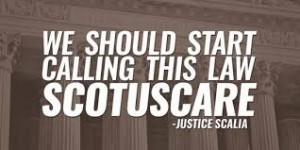Scalia wrote that the justices who authored the majority displayed “no semblance of shame” in their opinion. His dissent is littered with jabs at his fellow justices. “Today’s interpretation is not merely unnatural; it is unheard of,” Scalia writes. He describes another aspect of the majority’s analysis to be “pure applesauce.”
Scalia on Obamacare: ‘We Should Start Calling This Law SCOTUScare’
The justice wrote in his dissenting opinion Thursday that the Supreme Court had made a “defense of the indefensible.”
BY MARINA KOREN AND BRIAN RESNICK
In a landmark 6-3 ruling, the Supreme Court on Thursday upheld the Affordable Care Act’s insurance subsidies in every state.
The decision in the King v. Burwell case is a win for the White House. For Justice Antonin Scalia, who wrote the dissenting opinion, the majority opinion, which was authored by Chief Justice John Roberts, is a “defense of the indefensible.”
The decision, Scalia wrote, “rewrites the law.”
“We should start calling this law SCOTUScare,” he wrote.
He continued: “Rather than rewriting the law under the pretense of interpreting it, the Court should have left it to Congress to decide what to do about the Act’s limitation of tax credits to state exchanges,” Scalia wrote.
The ruling rejects a lawsuit that aimed to gut federal health care subsidies for people in 34 states. If the Court had ruled the other way, more than 6 million people would have been at risk of losing their coverage.
Scalia, who read his dissent from the bench, was joined by Justices Clarence Thomas and Samuel Alito in his dissent. Scalia took issue with the majority’s interpretation of the language within the Affordable Care Act. The law states that in order for people to qualify for health care subsidies, they need to be “enrolled in through an exchange established by the state.” The majority upheld that by “state,” the law referred to individual state exchanges or exchanges set up by the federal government. Otherwise, the majority opinion stated, state exchanges would drown in a “death spiral.”
Roberts wrote that “it is implausible that Congress meant the Act to operate in this manner.”
Scalia heavily criticized this reading, saying that the majority has erroneously interpreted the word “state” to also mean “federal government.” He called parts of the majority opinion “interpretive jiggery-pokery.”
“The Secretary of Health and Human Services is not a state,” he wrote. “Words no longer have meaning if an exchange that is not established by a state is ‘established by the state.'”
Scalia wrote that the justices who authored the majority displayed “no semblance of shame” in their opinion. His dissent is littered with jabs at his fellow justices. “Today’s interpretation is not merely unnatural; it is unheard of,” Scalia writes. He describes another aspect of the majority’s analysis to be “pure applesauce.”
King v. Burwell was one of the biggest legal challenges to Obamacare since 2012, when the Court upheld Obamacare’s individual mandate. In the conclusion of his dissent, Scalia said the Court got it wrong both times—and that it has shown bias toward the Obama administration’s policies.
“[T]he cases will publish forever the discouraging truth that the Supreme Court of the United States favors some laws over others, and is prepared to do whatever it takes to uphold and assist its favorites,” Scalia wrote. “I dissent.”
This story is breaking and will be updated.


